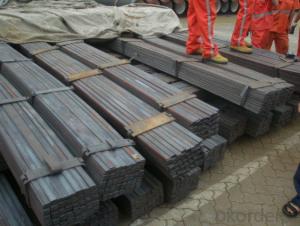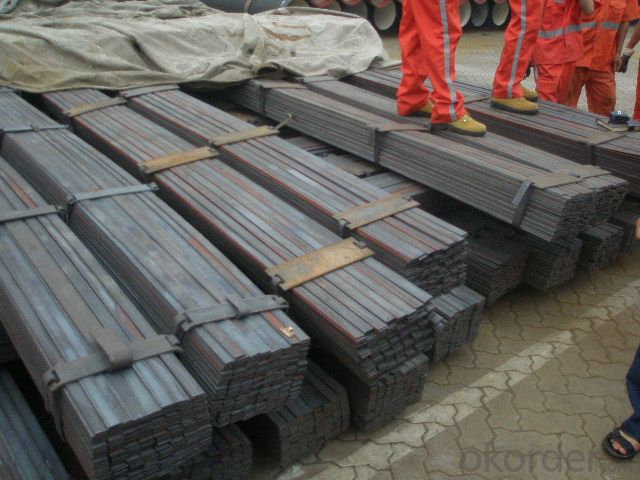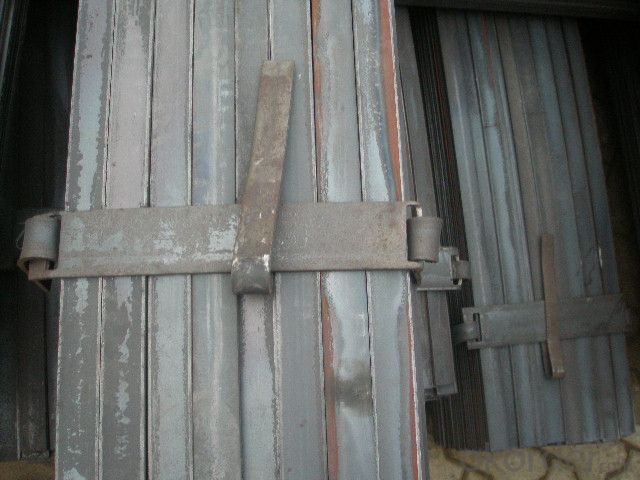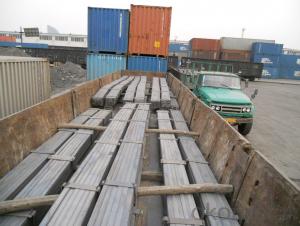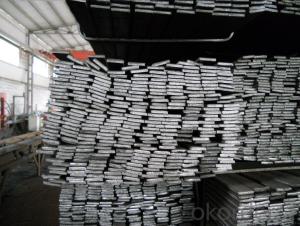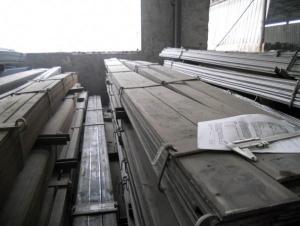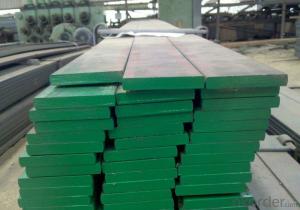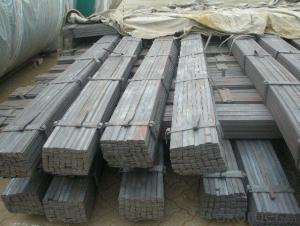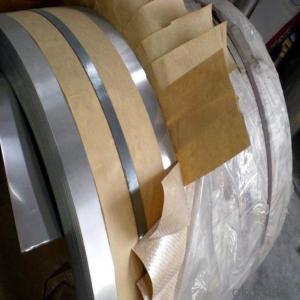Hot Rolled Steel Spring Flat Bar
- Loading Port:
- China Main Port
- Payment Terms:
- TT or LC
- Min Order Qty:
- -
- Supply Capability:
- -
OKorder Service Pledge
OKorder Financial Service
You Might Also Like
Product Description:
OKorder is offering high quality Steel Flat Bar at great prices with worldwide shipping. Our supplier is a world-class manufacturer of steel, with our products utilized the world over. OKorder annually supplies products to European, North American and Asian markets. We provide quotations within 24 hours of receiving an inquiry and guarantee competitive prices.
Product Applications:
Steel Flat Bar are ideal for structural applications and are widely used in the construction of buildings and bridges, and the manufacturing, petrochemical, and transportation industries.
Product Advantages:
OKorder's Steel Flat Bar are durable, strong, and resist corrosion.
Main Product Features:
· Premium quality
· Prompt delivery & seaworthy packing (30 days after receiving deposit)
· Corrosion resistance
· Can be recycled and reused
· Mill test certification
· Professional Service
· Competitive pricing
Product Specifications:
Commodity: Mild Steel Flat Bar
Standard: GB;JIS
Material: Q195-235;SS400
Origin place: China
Thickness: 3mm-30mm
Width:20mm-200mm
Length: Max 12m
Certification: SGS/BV
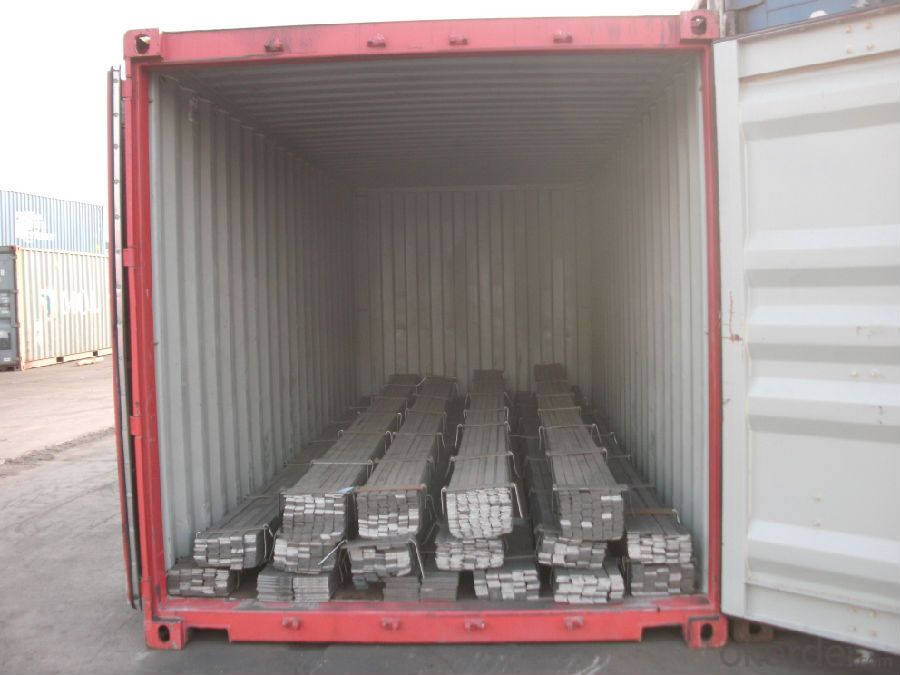
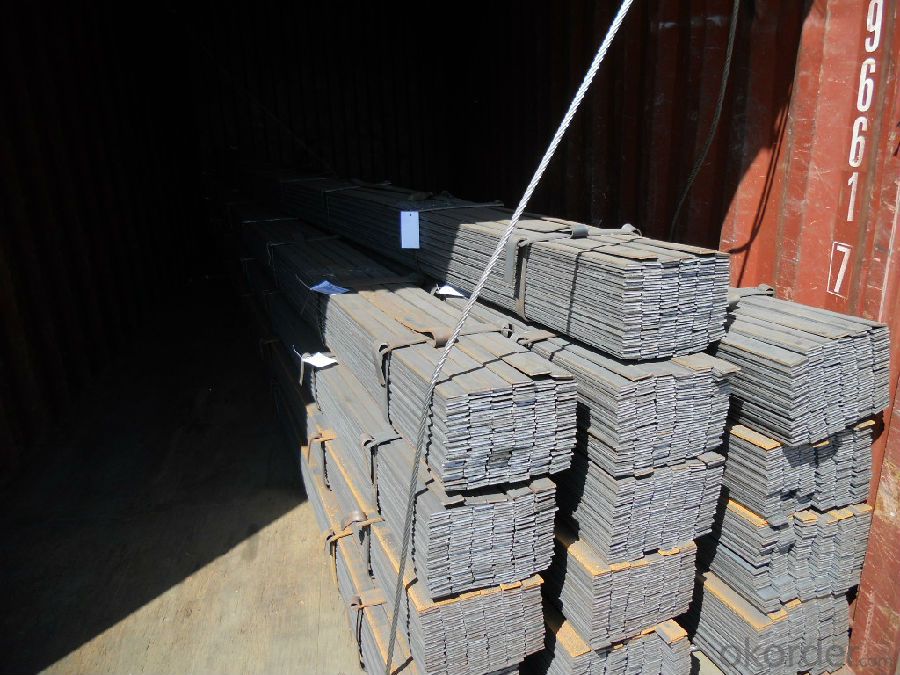
Packaging & Delivery of Mild Steel Flat Bar
Packaging Details: The Mild Steel Flat Bars are packed in bundles and loaded in 20 feet/40 feet container, or shipped by bulk cargo ,also we can do as customer's requirements.
Delivery Details:30~45 days upon the receipt of buyer payment by T.T. or L/C.
Production Flow of Steel Flat Bar
The Mild steel flat bar is made through three processes:
1.Feeding the material: Feeding the row material (the steel plate) to Slitting Line.
2.Slitting:The steel plate would be slitted into expected width by lengthways cutter.
3. Leveled and cutting: The plat bar would be ground into level by the grinder and then cut into required length
FAQ:
Q1: Why buy Materials & Equipment from OKorder.com?
A1: All products offered byOKorder.com are carefully selected from China's most reliable manufacturing enterprises. Through its ISO certifications, OKorder.com adheres to the highest standards and a commitment to supply chain safety and customer satisfaction.
Q2: How do we guarantee the quality of our products?
A2: We have established an advanced quality management system which conducts strict quality tests at every step, from raw materials to the final product. At the same time, we provide extensive follow-up service assurances as required.
Q3: How soon can we receive the product after purchase?
A3: Within three days of placing an order, we will begin production. The specific shipping date is dependent upon international and government factors, but is typically 7 to 10 workdays.
- Q: What are the different surface finishing methods used for special steel?
- There are several surface finishing methods used for special steel, each serving a specific purpose and achieving different results. Some of the common surface finishing methods for special steel include: 1. Grinding: Grinding is the process of using abrasive materials to remove excess material from the surface of the steel. It is typically used to achieve a smooth and polished finish, as well as to remove any imperfections or roughness. 2. Polishing: Polishing involves using polishing compounds and abrasive materials to create a smooth and shiny surface on the steel. This method is often used to enhance the aesthetic appeal of the steel and improve its corrosion resistance. 3. Shot blasting: Shot blasting is a technique that involves propelling small metal or mineral particles at high speeds onto the surface of the steel. This process helps to remove any contaminants, scale, or rust from the surface, resulting in a clean and uniform finish. 4. Electroplating: Electroplating is a process where a thin layer of metal is deposited onto the surface of the steel through an electrochemical reaction. This method is commonly used to enhance the appearance of the steel, improve its corrosion resistance, and provide a decorative or protective coating. 5. Passivation: Passivation is a chemical process that involves treating the surface of the steel with an acid solution to remove any impurities and create a passive, corrosion-resistant layer. This method is often used to improve the corrosion resistance of stainless steel and other alloys. 6. Coating: Coating is the process of applying a protective layer or coating onto the surface of the steel. This can include paints, lacquers, enamels, or other types of protective coatings that help to prevent corrosion, improve durability, or provide a specific aesthetic finish. It is important to note that the choice of surface finishing method for special steel depends on the desired outcome, such as aesthetics, corrosion resistance, or functionality. Additionally, the specific characteristics of the steel, such as its composition, hardness, and intended application, also play a significant role in determining the most suitable surface finishing method.
- Q: How does special steel contribute to the machinery manufacturing industry?
- Special steel plays a crucial role in the machinery manufacturing industry by providing high-quality and durable materials for the production of various machine components. This type of steel is specifically engineered to possess exceptional strength, toughness, and resistance to wear, corrosion, and high temperatures. In the machinery manufacturing industry, special steel is utilized in the production of critical components such as gears, shafts, bearings, and cutting tools. These components are subjected to extreme mechanical forces, exposure to harsh environments, and repetitive motion, requiring a material that can withstand such conditions without compromising performance or safety. The exceptional properties of special steel enable machinery manufacturers to produce equipment that is reliable, efficient, and long-lasting. By utilizing this type of steel, manufacturers can enhance the overall performance and durability of their machinery, ensuring optimal functionality and minimizing the need for frequent repairs or replacements. Moreover, special steel allows for the design and production of more compact and lightweight machinery, leading to improved energy efficiency, reduced manufacturing costs, and increased productivity. The high strength-to-weight ratio of special steel enables the production of smaller and lighter components, without sacrificing durability or performance. Furthermore, the corrosion and heat resistance properties of special steel make it suitable for use in industries with demanding operating conditions, such as aerospace, automotive, and energy. It ensures that machinery can withstand extreme temperatures, chemical exposure, and abrasive environments, enhancing safety and reliability. In conclusion, special steel significantly contributes to the machinery manufacturing industry by providing materials with exceptional strength, toughness, and resistance to wear, corrosion, and high temperatures. Its utilization in critical components ensures the production of reliable, efficient, and durable machinery, leading to improved performance, reduced costs, and increased productivity.
- Q: How is special steel used in the mining industry?
- Special steel is widely used in the mining industry due to its exceptional properties such as high strength, durability, and resistance to wear and corrosion. It is utilized in various applications including the manufacturing of drilling tools, crushing equipment, conveyor systems, and structural components for mining machinery. Additionally, special steel is used in the production of wear-resistant plates and liners, which protect mining equipment from abrasion and extend their lifespan. This type of steel plays a crucial role in enhancing the efficiency and safety of mining operations.
- Q: What are the main characteristics of alloy steel?
- Alloy steel is a type of steel that is made by adding certain elements, such as chromium, nickel, or molybdenum, to iron. These additional elements give alloy steel its unique properties and characteristics. Some of the main characteristics of alloy steel include: 1. High strength: Alloy steel is known for its exceptional strength. The addition of alloying elements enhances the steel's ability to withstand high pressures and heavy loads, making it ideal for applications that require a strong and durable material. 2. Hardness: Alloy steel is also known for its hardness. It has a higher level of hardness than regular carbon steel, which makes it resistant to wear, abrasion, and deformation. This characteristic makes alloy steel suitable for applications where resistance to impact or wear is crucial, such as in the manufacturing of cutting tools or machinery parts. 3. Corrosion resistance: Depending on the specific alloying elements added, alloy steel can exhibit excellent resistance to corrosion. Chromium, for example, is commonly added to alloy steel to create stainless steel, which is highly resistant to rust and corrosion. This characteristic makes alloy steel a preferred material in industries where exposure to moisture or corrosive environments is common. 4. Heat resistance: Alloy steel is known for its ability to withstand high temperatures without losing its strength or structural integrity. The addition of elements like nickel, molybdenum, or vanadium enhances the steel's ability to resist thermal expansion, oxidation, and softening at elevated temperatures. This characteristic makes alloy steel suitable for applications in the aerospace, automotive, and power generation industries. 5. Versatility: Alloy steel is a versatile material that can be easily customized to meet specific requirements. By varying the composition and proportions of alloying elements, manufacturers can create alloy steel with a wide range of properties, such as improved ductility, toughness, or electrical conductivity. This versatility allows alloy steel to be used in various industries, including construction, manufacturing, and engineering. Overall, the main characteristics of alloy steel are high strength, hardness, corrosion resistance, heat resistance, and versatility. These properties make alloy steel a preferred choice for a wide range of applications that require a strong, durable, and reliable material.
- Q: How does special steel contribute to the metalworking industry?
- Special steel plays a crucial role in the metalworking industry by providing enhanced properties and performance that regular steel cannot achieve. It contributes to the industry in several ways: 1. Improved Strength and Durability: Special steel is manufactured with specific alloys and composition, making it stronger and more durable than regular steel. This enables it to withstand high temperatures, heavy loads, and extreme environments, making it ideal for applications in industries such as aerospace, automotive, and construction. 2. Enhanced Corrosion Resistance: Special steel is often designed to have superior resistance to corrosion compared to regular steel. This makes it highly suitable for applications in marine, chemical, and oil and gas industries, where exposure to harsh environments and corrosive elements is common. 3. Increased Hardness and Wear Resistance: Special steel can be engineered to have higher hardness and wear resistance, making it ideal for manufacturing cutting tools, dies, molds, and other components that require prolonged usage and resistance to wear and tear. This contributes to increased productivity and efficiency in metalworking processes. 4. Precision Machining: Special steel offers excellent machinability, allowing for precise shaping, drilling, and cutting. This enables manufacturers to create complex and intricate designs with ease, resulting in high-quality finished products and components. 5. Customization and Flexibility: Special steel can be tailored to meet specific requirements, allowing for customization and flexibility in design and application. Manufacturers can choose from a wide range of special steel grades, each with its unique properties, to suit their specific needs. Overall, special steel significantly contributes to the metalworking industry by providing enhanced strength, durability, corrosion resistance, hardness, wear resistance, machinability, and customization options. It enables the industry to manufacture high-quality products, improve efficiency, and meet the demanding requirements of various sectors.
- Q: How is special steel used in the production of automotive springs?
- Special steel is used in the production of automotive springs due to its high strength and durability properties, which are essential for supporting the weight of the vehicle and providing a smooth ride. The special steel's unique composition and manufacturing processes ensure that the springs can withstand repeated stress and maintain their shape over time, enhancing the overall performance and safety of the vehicle.
- Q: How does special steel contribute to the transportation equipment industry?
- Special steel plays a crucial role in the transportation equipment industry by providing high strength, durability, and resistance to wear and corrosion. It allows for the construction of lighter yet stronger components, leading to improved fuel efficiency, increased payload capacity, and enhanced safety in vehicles. Additionally, special steel enables the production of precision parts and components, ensuring the reliability and performance of transportation equipment.
- Q: How does special steel contribute to the chemical processing aftermarket industry?
- The chemical processing aftermarket industry heavily relies on special steel, which offers a wide range of benefits to enhance the efficiency and performance of equipment. Firstly, special steel is well-known for its exceptional strength and durability, making it ideal for applications involving high pressure, extreme temperatures, and corrosive environments. This durability ensures that the equipment can withstand challenging conditions and operate reliably for extended periods, reducing the need for frequent maintenance and replacement. Furthermore, special steel possesses excellent resistance to corrosion, oxidation, and chemical reactions, which are common challenges in the chemical processing industry. This resistance allows the equipment to handle various chemicals without deteriorating or contaminating the process, ensuring the quality and safety of the end products. Additionally, special steel can withstand the formation of scale, deposits, and other contaminants that can hinder equipment efficiency, reducing the frequency of cleaning and maintenance. Moreover, special steel offers superior mechanical properties such as toughness, hardness, and impact resistance, which are essential for handling heavy loads and abrasive materials. This ensures that the equipment can withstand demanding operational conditions and maintain its performance over time, resulting in enhanced productivity and reduced downtime. Another significant contribution of special steel to the chemical processing aftermarket industry is its versatility. It can be customized and tailored to meet specific requirements, allowing for the manufacturing of complex parts and components essential for various chemical processes. Special steel can be fabricated into different shapes and sizes, enabling the creation of intricate designs and structures that optimize equipment efficiency and effectiveness. In conclusion, special steel is vital to the chemical processing aftermarket industry due to its exceptional strength, durability, resistance to corrosion and chemical reactions, as well as its versatility. By providing reliable and high-performance equipment, special steel significantly contributes to the overall efficiency, safety, and productivity of chemical processing operations.
- Q: Can special steel be used in the defense industry?
- Yes, special steel can be used in the defense industry. Special steel, such as high-strength steel or armor-grade steel, possesses unique properties that make it suitable for various defense applications. It can be used for manufacturing military vehicles, aircraft components, body armor, ballistic plates, and other defense equipment that require enhanced strength, durability, and resistance to extreme conditions. Special steel's ability to withstand impacts, provide protection against projectiles, and maintain structural integrity makes it an essential material in the defense industry.
- Q: How does special steel contribute to the manufacturing of springs for automotive applications?
- Special steel is crucial for the manufacturing of springs in automotive applications because it offers high strength, durability, and excellent fatigue resistance. It allows springs to withstand heavy loads, vibrations, and extreme temperatures while maintaining their shape and performance over time. Special steel also provides flexibility in design, allowing for the production of springs with specific characteristics such as improved stability, reduced weight, and enhanced energy absorption. Overall, the use of special steel in spring manufacturing ensures reliable and efficient performance in automotive applications.
Send your message to us
Hot Rolled Steel Spring Flat Bar
- Loading Port:
- China Main Port
- Payment Terms:
- TT or LC
- Min Order Qty:
- -
- Supply Capability:
- -
OKorder Service Pledge
OKorder Financial Service
Similar products
Hot products
Hot Searches
Related keywords
